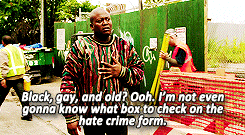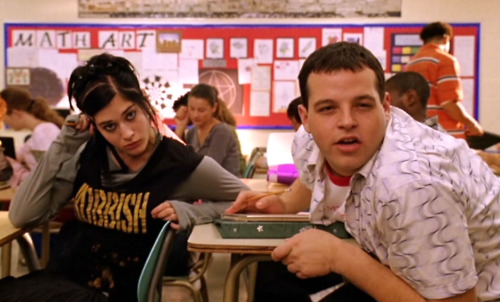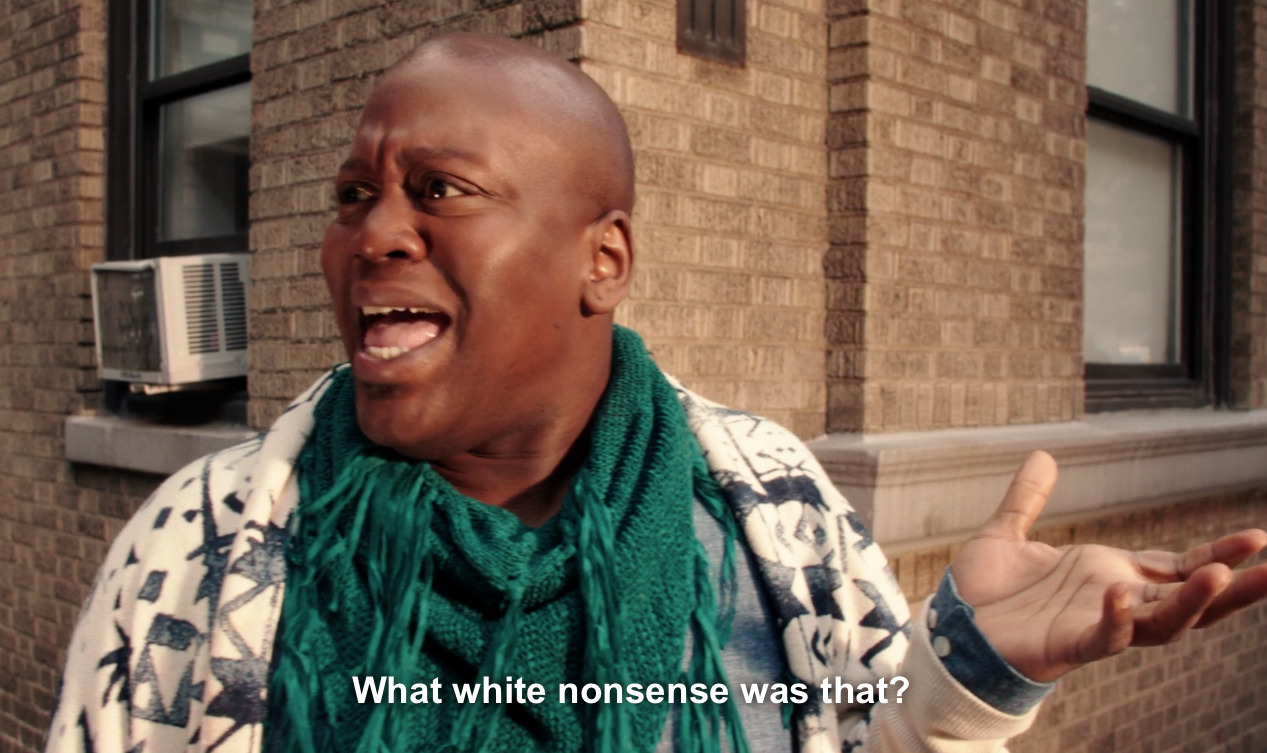Please welcome new contributor Kyle Turner to the team, who has previously Smackdown'ed right here. In the wake of the Emmy nominations, he's here to talk about one very particular film & tv trope - Editor
 In Tina Fey’s book of autobiographical essays Bossypants, she describes with delight and nostalgia her time growing up working at the Delaware County Summer Showtime program for the arts. And while her experiences about her background in theater are the surface, it’s her relationship to the queer community that serves as, perhaps, the thesis and thematic core of the essay. She writes carefully, balancing emotional reaction of the present juxtaposed against examining the events in hindsight. She talks about the lesbian best friends she had for several years, the way her hometown was like “Gay Wales” (“What Wales is to crooners, my hometown may be to homosexuals – meaning, there seems to be a disproportionate number of them and they are the best in the world!”), and, most important, the role of LGBT people in her personal narrative(s). She writes
In Tina Fey’s book of autobiographical essays Bossypants, she describes with delight and nostalgia her time growing up working at the Delaware County Summer Showtime program for the arts. And while her experiences about her background in theater are the surface, it’s her relationship to the queer community that serves as, perhaps, the thesis and thematic core of the essay. She writes carefully, balancing emotional reaction of the present juxtaposed against examining the events in hindsight. She talks about the lesbian best friends she had for several years, the way her hometown was like “Gay Wales” (“What Wales is to crooners, my hometown may be to homosexuals – meaning, there seems to be a disproportionate number of them and they are the best in the world!”), and, most important, the role of LGBT people in her personal narrative(s). She writes
I thought I knew everything after that first summer. ‘Being gay is not a choice. Gay people were made that way by God,’ I’d lectured Mr. Garth proudly. But it took me another whole year to figure out the second part: ’Gay people were made that way by God, but not solely for my entertainment.’ ”
In one quote, Fey pinpoints a problem that mainstream media often has when depicting queer (usually male) characters: they’re often asexual, thinly written, or designed with tropes built in as opposed to given the benefit of complexity that their straight counterparts more reflexively are given. They are, in a word, tokenized. [More...]
It’s exactly this conundrum that Fey acknowledges, but doesn’t seem to know how to solve, through the character of Titus Andromedon in the newly Emmy nominated Netflix hit Unbreakable Kimmy Schmidt. Titus's inability to seduce a man in Unbreakable Kimmy Schmidt's “Kimmy Kisses a Boy!” episode – something he was once apparently expert at – causes him to panic, wondering...
Am I not a pretty young thing anymore? Am I a bear now? Or a Huxtable?”
It’s a rather amusing punchline, but one that also speaks to the roles of the archetype of the gay best friend in general (the GBF), and particularly the black gay best friend.
It’s funny that Fey should know exactly what the issue is, especially since she has been guilty, in the past, of perpetuating it. Though, to be fair, her depictions of LGBT characters on 30 Rock, while peripheral and uncomplicated, were, at times, mildly subversive. When a queer character has been on screen in 30 Rock, Fey and writing partner Robert Carlock illustrate these initially reiterations of gay conventions and slightly tip them on their ear, or make it so that the joke is on the judgmental. (“James. Not Jimmy, not Jim… Jamesssssss,” Jack Donaghy (Alec Baldwin) hisses when telling Liz Lemon about the interior decorator he hired.)
Walking by himself, wearing a funny sweater, Titus laments...

The larger gay community exists in hierarchies, and when you don’t fit into any of the prescribed boxes, you’re essentially “caste” aside. Age and body image is critical to understanding this hierarchy, given that so many of the labels are predicated on those aspects (“daddy”, “twink”, etc.). Titus neglects to mention his weight, but, nevertheless this sort of existential crisis is kind of critical to understanding the archetype he fits into as a whole, especially with regards to how the hierarchies are portrayed in media.
The Gay Best Friend is essentially an ornamental character devoid of any real sense of autonomy. They exist, as Fey worded it earlier, 'for [audience’s] sole entertainment'. They’re the accessory to our protagonist, usually female and straight, and their utility is mostly to make funny/snark/bitchy comments or sympathize with said female protagonist with any of their romantic woes. They’re attracted to the same thing, so of course the GBF will understand their plight. But this archetype never really expresses desire on their own terms, unless it’s contingent on how the female protagonist, or even the object of desire, is supposed to feel. Jack on Will & Grace is a classic example who, while later in the series was given heftier storylines, mostly was the comic relief whose desires were played for humor and almost never taken seriously. They are, for all intents and purposes, asexual.

Often the GBF exists in the form of either the twink (young, white, hairless, effeminate) or the sassy black character (age doesn’t always matter, body weight fluctuates, effeminate). Fey’s dabbled here before, with the character of Damian (Daniel Franzene) in Mean Girls, who, though not a twink, fulfills these criteria – he’s too gay to function to have much depth in the film (even Lizzy Caplan’s Janice has her art as both a goal and a texture). There’s slightly more stock in the former iteration than in the latter, inasmuch as they’re more visible and, infrequently, given nuance. Sometimes, they’re even used for the purpose of deconstruction, such as in GBF, a teen comedy that admirably attempts to examine the tokenism that the archetype has ushered in since proliferating on tv and in film. If not for deconstruction, their nuance has been most often presented in tragic form: Chris Colfer’s Kurt on Glee, Randy Harirson’s Justin Taylor on Queer as Folk, etc.
But since Titus basically doesn’t quite fit the tribes that are most valued within the gay community – jocks, bears, twinks, etc. – he’s left with nothing to do. Hence, the self-doubt regarding his virility and, much more, his viability as a sexual creature. Which means he has to be relegated to being a GBF.
It means that Titus, regardless of his development in the first season as it exists, still has that hurdle to get past, and Fey and Carlock have to do that. Titus is given the benefit of personal arcs (“Peeno Noir”), and sexual desires, though they’re played primarily for laughs. But the finale suggests that we’ll be able to dig deeper into Titus as a character almost as elegantly drawn as Kimmny herself. And while I don’t expect Fey to solve the issue of the GBF in season 2, I do hope she takes an opportunity to allow that archetype to be subverted, for it to evolve, and to give Titus, and other queer characters of color, some time in the spotlight.
Related:
FYC Supporting Actor Tituss Burgess
LGBT interest articles
